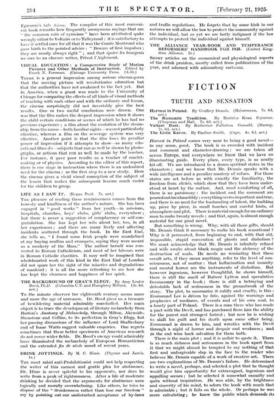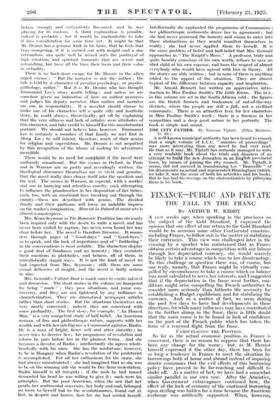FICTION
TRUTH AND SENSATION
The Little Karoo. By Pauline Smith. (Cape. 43. 61. net.) Harvest in Poland comes very near to being a good novel— in any sense, good. The book is so crowded with incident and comment and character-drawing : we are taken all across Europe, and everywhere we know that we have an illuminating guide. Every place, every type, is so neatly hit off. We are introduced to a dozen spiritual states in the characters ; and we know that Mr. Dennis speaks with a wide intelligence and a peculiar mastery of values. For those states are set before• us with exactly the familiarity, the freedom from clichés, which show that they have been under- stood at heart by the author. And, most comforting of all, there is no parsimony : the incident and the comment are poured out inexhaustibly ; everything seems important and true, and there is no need for the husbanding of talent, the building up, piece by piece, in small touches and careful hints, of atmosphere and plot. There is material enough for an ordinary man to make twenty novels ; and that, again, is almost enough material for one good novel.
But something is wrong. Why, with all those gifts, should Mr. Dennis think it necessary to make his book sensational Why is it permeated, from beginning to end, with that old, impossible, stupid convention of ghosts and diabolism ? We must acknowledge that Mr. Dennis is infinitely refined and wide awake about black magic and the alchemy of the destruction of souls. He needs no reminding that these occult arts, if they mean anything, refer to the level of con- sciousness, not of matter : that hallucination and insanity and mental horror are the instruments of diabolism. Bid however ingenious, however thoughtful, he shows himself, there is still the smell of Bulwer Lytton and speculative freemasonry in the book ; there is still a betraying and detestable lack of seriousness in the groundwork of the story. The plot, to summarize it coldly and cruelly, is this : Emmanuel Lee is driven by fate, against the warnings and prophecies of mediums, of events and of his own soul, to a lonely part of Poland. There is a man there who has made a pact with the Devil, and has purchased from him the ability for the purest and strongest hatred ; but now he is wishing to shift his guilt and his death upon some other being. Emmanuel is drawn to him, and wrestles with the Devil through a night of horror and despair and weakness ; and in the end wins back salvation for them both.
There is the main plot ; and it is unfair to quote it. There is so much richness and seriousness in the book apart from it that we might almost be tempted to say nothing of that first and unforgivable slap in the face to the reader who believes Mr. Dennis capable of a work of creative art. There are two explanations of Mr. Dennis's failure. He determined to write a novel, perhaps, and selected a plot that he thought would give him opportunity for extravagant, ingenious and appalling scenes ; but he selected it somewhat casually and quite without inspiration. He was able, by the brightness and sincerity of his mind, to adorn the book with much that is admirable ; but it fails on the whole. Or perhaps he was more calculating ; he knew the public which demands its
fiction strongly and outlandishly flavoured, and he was playing for its custom. A third explanation is possible, indeed is probable ; but it would be uncharitable to take it into consideration for sonic time yet. It might be that Mr. Dennis has a genuine kink in his taste, that he feels that bogy-mongering, if it is carried out with insight and a due rationalism, can quite well be mixed with the portrayal of high emotions and spiritual torments that arc severe and astonishing, but have all the time their basis and their value in actuality.
There is no back-door escape for Mr. Dennis in the often
urged excuse : " But the narrator is not the author ; the tale is told by a character of peculiar psychology, or."psycho-
pathology, rather." But it is Mr. Dennis who has thought Emmanuel Lee's story worth telling ; and unless we are somehow given an indication of how an author perceives and judges his deputy narrator, then- author and narrator arc one in responsibility. if a novelist should choose to make one of his characters tell a. quite:silly and inartistic story, he could always, theoretically, get off by explaining
that the very silliness and lack of artistry were-attributes of this character, and take credit to himself for this unsubstantial
portrait. We should not believe him, however. Emmanuel
Lee is certainly a member of that family we met first in Mary Lee ; he will inherit, therefore, much of their genius for religion and superstition. Mr. Dennis is not acquitted by this • recognition -of the blame of making his adventures incredible. • There would be no need for complaint if _the.-novel were uniformly sensational. But the scenes in Oxford, in Paris and in Warsaw are so justly and revealingly written, the theological discourses themselves are so vivid and genuine, that the novel really does cleave itself into the spookish and the real. .The scenes in Warsaw, in especial, with a mother and son in harrying and relentless enmity, each attempting_ to influence the grandmother in her disposition of her riches, each, too, with an emotional love breaking out through the enmity—these are described with genius. The divided family and their partisans will leave an indelible impress on the reader's imagination. Halted in Poland at moments is almost a masterpiece.
Mrs. Kean Seymour in The Romantic Tradition has obviously been inspired only with the desire to write a novel, arid has
never been visited by rapture, has never even found her way clear .before her. The novel is therefore tiresome. It maun- ders through pages of " Good-days " and " Good-byes," so to speak, and the lack of importance and of " furthering " in the conversations is most notable. The characters display a good• deal of frankness and no honesty ; they overstate their emotions in platitudes, and behave, all of them, in unrealistivally stupid ways. It is not the kind of novel we bad expected from Mrs. Seymour ; still, there arc some casual delicacies of insight, and the novel is fairly serious in aim.
Mrs. Gcrould's Valiant Dust is much surer to excite interest and discussion. The short stories in the volume arc hampered
by being " made " ; they pose situations, and rouse con- troversy, and they are not lightened by any brilliance in characterization. They arc dramatized newspaper articles rather than short stories. But the situations themselves are very neatly conceived ; indeed, they arc conceived with some profundity. The first story, for example, "An Honest
Man," is a very competent study of half-belief. An American woman, of free and philanthropic nature, supports with her wealth and with her intelligence a Communist agitator, Raclin. Ile is a man of bright, fierce will and utter sincerity; he never tries to deceive her ; his programme of revolution and reform he puts before her in the plainest terms. - And she becomes a devotee of Radin ; intellectually she agrees whole7. heartedly with his aims. She has the misfortune, however, to be in Hungary when Radin's revolution of the proletariat is accomplished. For all her enthusiasm for the cause, she had always miscalculated : she had imagined that as she was to be on the winning side she would be free from molestation. Raclin himself is all integrity ; if the mob he had roused demanded his head he was willing to give it : such were his principles. But the poor American, when she saw that her pearls, her sentimental souvenirs, her body and soul, belonged no more to herself but to the revolutionaries, found out at last, in despair and horror, how far she had misled- herself'-
Intellectually she applauded the programme of Communism ; her philanthropic sentiments drove her to agreement ; but she had never possessed the honesty and vision to enter into those abstractions as they would manifest themselves in reality ; she had never applied them - to -herself. It is the same problem of belief and half-belief that Mrs. Gerould approaches in " The Knight's Move." A professor, truly and _ quite humbly conscious of his Own wortli, refuses to save an idiot child at his own expense, and loses the respect of almost everybody who would have agreed with him in theory. All the stories are ably written ; but in none of them is anything added to the appeal of the situation. They are niftiest typical of the difference_between capacity and inspiration.
Mr. Arnold Bennett has written an appreciative intro- duction to Miss Pauline Smith's The Little Karoo. The ta7e in this volume are set in the South African veld ; the figures are the Dutch farmers and tradesmen of out-of-the-way districts, where the people are still a folk, not a civilized
community. There is an attractive love for her characters in Miss Pauline Smith's work ; there is a fineness in her sympathies and a deep good nature in her portraits. The book is simple and sound.











































 Previous page
Previous page